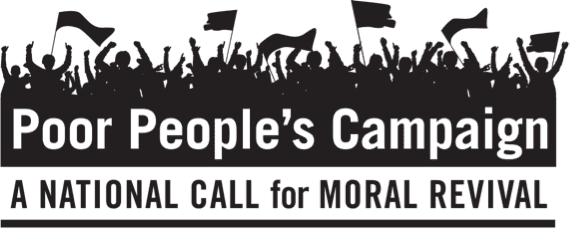According to WorkForce West Virginia, West Virginia lost 90,100 jobs in April, as the COVID-19 pandemic and the response to it rocked the state’s economy. Since the end of March, 157,807 West Virginians have filed for unemployment insurance.
This week, the Department of Labor released data on the characteristics of those who filed unemployment claims in April. With that information, we are able to tell who has been most affected by job losses and what industries have been hit hardest. And while no demographic group or industry was unaffected, the impact of the job losses have not been equal.
Overall, the number of West Virginians claiming unemployment benefits increased from 14,154 in March to 146,566 in April, an increase of 132,412, or 936%.
Women made up most of that increase. The number of women claiming unemployment benefits increased from 3,111 in March to 76,075 in April, an increase of 72,964 or 2,345%. Women accounted for 51.9% of April’s unemployment claims, compared to just 22.0% of March’s.
Read more in Sean’s blog post.
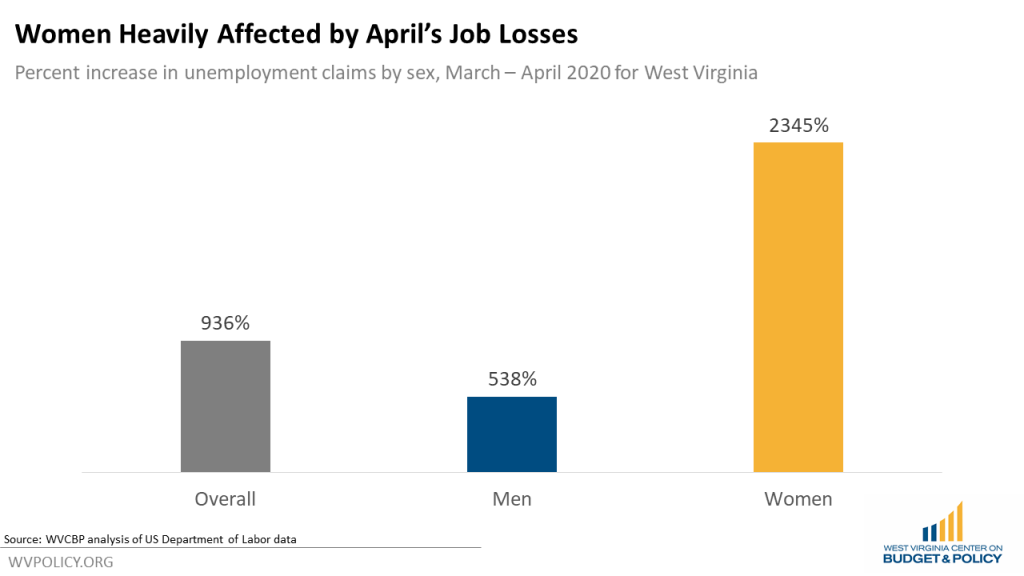
While West Virginia has avoided major budget problems, so far, it is unlikely to continue as several billion dollars in federal aid dries up and the economic reality of the pandemic-induced recession continues to put downward pressure on state and local budgets.
Policymakers would be wise to take this time to plan accordingly, ensuring all federal aid is used appropriately and we don’t further depress our state’s economy with public-sector layoffs and disinvestments in colleges, schools and communities. These challenging economic times only will become harder if our response is to ignore and choke off revenue to hospitals, schools, small businesses, teachers and first responders – all the indispensable people and services that make our communities thrive.
Read Ted’s full op-ed here which ran in this week’s Charleston Gazette-Mail.
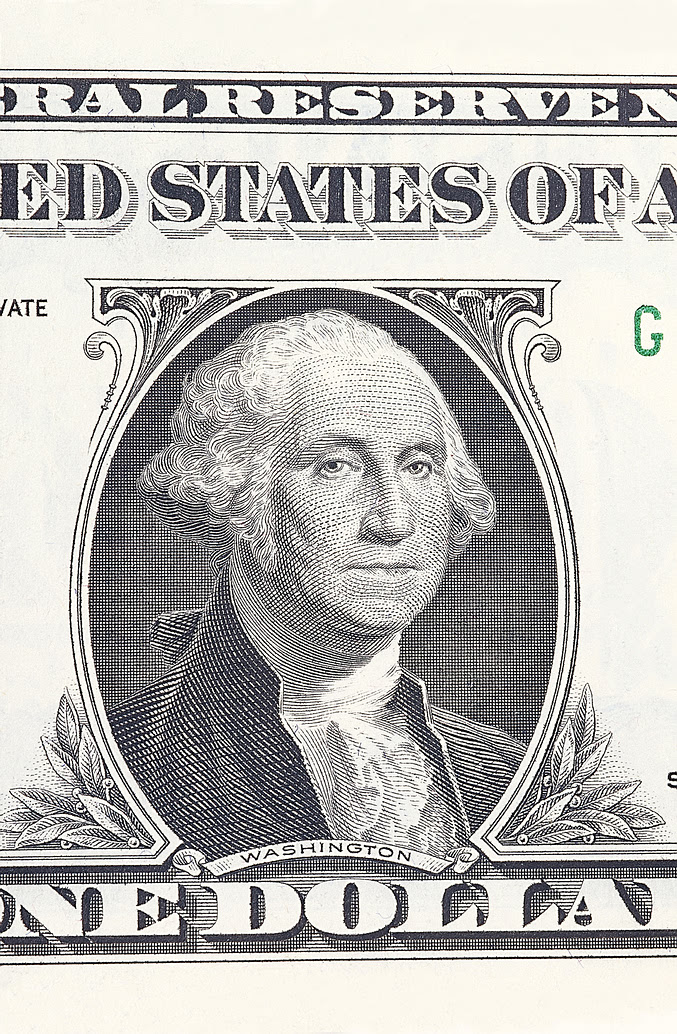
The WVCBP is proud to be a member of the WV Food for All Coalition. Recently, one of the coalition members, Joshua Lohnes, was a signatory on the a letter, COVID-19 And the Right to Food: Exploring the Emergence of a Global Solidarity Alliance for Food, Health and Social Justice, published on Whyhunger.org.
“The Global Solidarity Alliance’s focus on so-called “wealthy” countries is a means to build a shared understanding among those in North America and Europe – especially among those who are on the frontlines and work alongside those most impacted by hunger and poverty – of the patterns of destructive policies which have taken hold in North America and are being replicated without criticism in European Countries, and beyond. We seek to build together collective strategies of resistance and alternative models and practices to promote the fulfillment of the right to nutritious food in our respective parts of the world. We also want to invite participation from beyond North America and Europe. In so doing, we will be better prepared to accompany our global allies who have long felt the perverse effects of resource extraction and colonialism by our governments and open collective pathways to authentically struggle for food sovereignty as a right of all people everywhere.”
Read the full letter here.
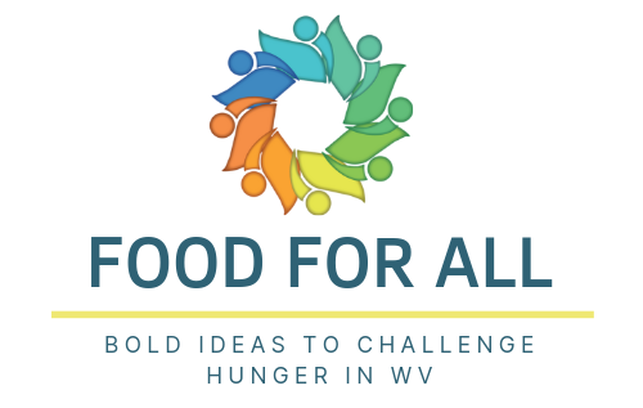
The recent COVID-19 outbreak at Huttonsville Correctional Center shines a light on why universal and periodic testing of incarcerated individuals and staff at correctional facilities combined with policies to reduce incarceration are so important to protect the health of rural communities during a pandemic.
Lack of adequate COVID-19 testing within correctional facilities caught up with West Virginia when over 100 inmates and 8 staff members at the Huttonsville Correctional Center tested positive for coronavirus. Shortly after it was clear there was an outbreak, Governor Jim Justice publicly committed to test all those incarcerated in addition to all staff at correctional facilities throughout the state. Local officials in Randolph County organized two testing sites, reaching over 800 people in the community.
Read more in Seth’s blog post.
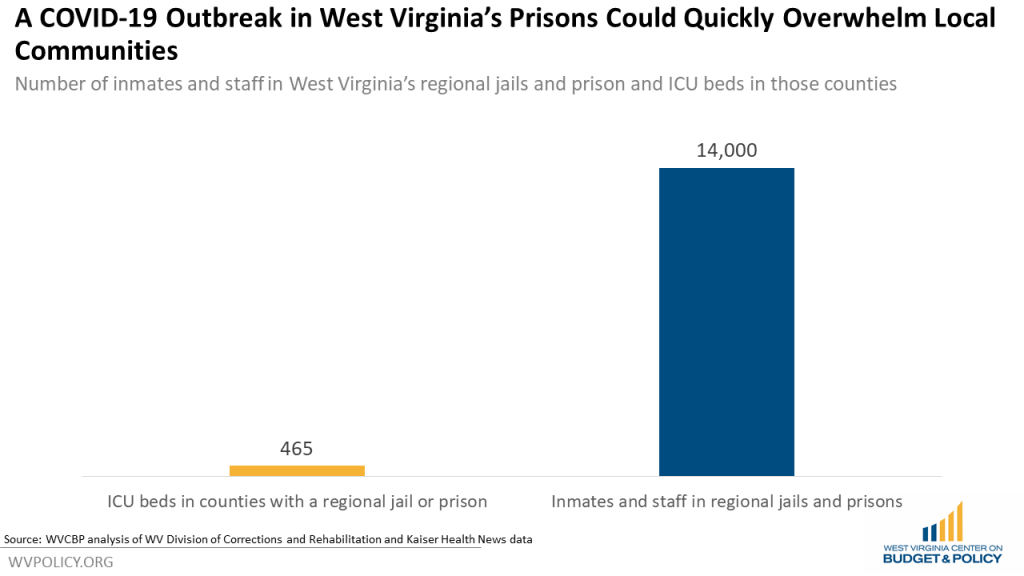
With the emergence of COVID-19 over the past several months, various systems of criminal justice in West Virginia have been forced to adjust their practices in order to reduce the spread of the disease. Previous analysis has shown a reduction in the prison and jail system populations in West Virginia. New evidence out of Charleston, West Virginia shows that there has been a large reduction in arrest rates as well.
In response to a Freedom of Information Act (FOIA) request by the ACLU of West Virginia, the city of Charleston provided the West Virginia Center on Budget and Policy with the city’s arrest records from March and April of 2019 and 2020.
The arrest records show a substantial reduction in arrests in March and April of 2020 compared to 2019. The city of Charleston’s police made 359 arrests in March and April of 2020, down from 863 from the same months in 2019, a decline of 58 percent.
Read more in Ryan’s blog post.
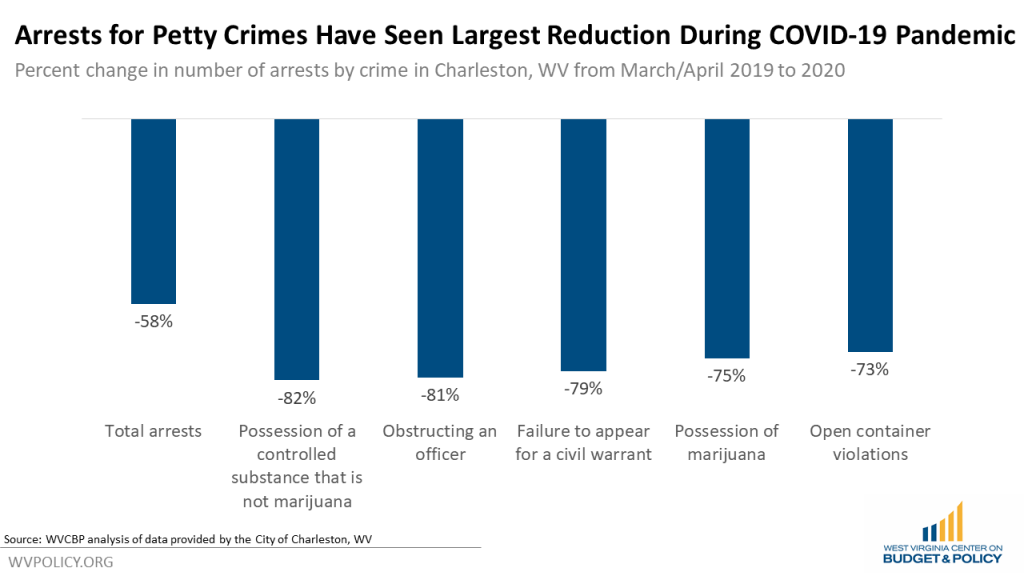
For more information on the impact of the pandemic on West Virginia’s economy, safety net, unemployment resources, and more, please visit our special website page.

COVID-19 has forced the nation into an unprecedented emergency. The current emergency, however, results from a deeper and much longer-term crisis – that of poverty and inequality, and of a society that has long ignored the needs of 140 million people who are poor or one emergency away from being poor.
In 1968, Rev. Dr. Martin Luther King Jr. and many others called for a “revolution of values” in America and sought to build a broad movement that could unite poor and dispossessed communities across the country. Today, the Poor People’s Campaign: A National Call for Moral Revival has picked up this work. People across the nation have joined under the banner of the Campaign to confront the interlocking evils of systemic racism, poverty, climate change and ecological devastation, militarism and the war economy, and the distorted moral narrative of religious nationalism.
They are coming together to demand that the 140 million poor and low-income people in our nation – from every race, creed, gender, sexuality and place – are no longer ignored, dismissed or pushed to the margins of our political and social agenda. Add your voice by attending the Mass Poor People’s Assembly and Moral March on Washington Digital Justice Gathering, on June 20, 2020.
The Poor People’s Assembly and Moral March on Washington will be an historic, generationally transformative digital event using the internet and the airwaves to drive the vision and agenda of our communities into the heart of the national narrative.
History teaches us that it is exactly in moments like these that a movement of the many is necessary to force the nation into action. In the midst of pandemic, economic collapse, climate change, and more, the key to real and lasting change lies within our communities – within our ability to come together in new and bold ways.
Register here.
